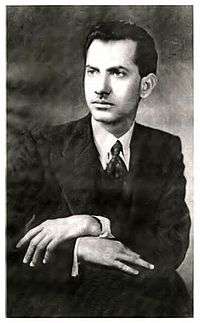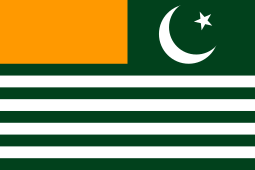Muhammad Ibrahim Khan (politician)
Sardar Muhammad Ibrahim Khan (10 April 1915 – 31 July 2003), also known as Bani-e-Kashmir ("Father of Azad Kashmir") and Ghazi-e-Millat ("Hero of the Nation"), was the founder and first President of Azad Kashmir. He played a pivotal role in Operation Gulmarg .In British India of 1946, he won the Jammu and Kashmir State Assembly election as a member of the Muslim Conference party and became a member of the Praja Sabha under Maharajah Hari Singh. Jammu and Kashmir signed a stand still agreement with Pakistan as a result of the India Independence Act. In 1947, he instigated and organised the Poonch rebellion, with the help of Pakistan Army and the Muslim League, the invasion of Jammu and Kashmir.[2] He belonged to Sudhan tribe.[3] This Pakistani sponsored tribal invasion, despite the stand still agreement was a rude shock to the King. He signed the Instrument of Accession with India [4] and requested the help of Indian troops to liberate the region. The Prime Minister of India, Nehru also took the dispute to the United Nations as he could not stop the plunder and partial occupation by the invading militia.
Sardar Ibrahim Khan | |
|---|---|
 Sardar Muhammad Ibrahim Khan as the 32 years old, first President of Azad Kashmir in 1948 | |
| President of Azad Jammu and Kashmir | |
| In office 25 August 1996 – 25 August 2001 | |
| Preceded by | Abdul Rashid Abbasi (interim) |
| Succeeded by | Sardar Muhammad Anwar Khan |
| In office 5 June 1975 – 30 October 1978 | |
| Preceded by | Sardar Mohammad Abdul Qayyum Khan |
| Succeeded by | Brigadier Muhammad Hayat Khan |
| In office 13 April 1957 – 30 April 1959 | |
| Preceded by | Sardar Mohammad Abdul Qayyum Khan |
| Succeeded by | Khurshid Hasan Khurshid |
| In office 24 October 1947 – 12 May 1950 | |
| Succeeded by | Captain General Syed Ali Ahmed Shah |
| Personal details | |
| Born | 10 April 1915 Kot Mattay Khan, Poonch district, Kashmir and Jammu, British India |
| Died | 31 July 2003 (aged 88)[1] Islamabad, Pakistan |
| Political party | Muslim Conference, Jammu Kashmir Peoples Party |
| Spouse(s) | Zaib-un-Nisa Khan |
| Relations |
|
After fighting the Indian Army for 15 months, the Azad Kashmir militia accepted a United Nations-mediated ceasefire. Khan and his army were able to capture substantial portions of the three western districts of Kashmir, which were renamed Azad Kashmir.
Khan was appointed the first President of tiny Azad Kashmir in 1948 by Pakistan. He represented Kashmir in different capacities at the United Nations from 1948 to 1971.[2][5]
Sardar Muhammad Ibrahim Khan also wrote a book named The Kashmir Saga on government and politics of Azad Kashmir and history and philosophy of freedom struggle.
Early life and education
Sardar Muhammad Ibrahim Khan was born on 10 April 1915 in Kot Mattay Khan, a village in the Poonch District of Kashmir. He received his primary education in his village. He attended college and received a Bachelors of Arts degree in 1935 at Islamia College (Lahore) and sought higher education abroad in 1938. He obtained his LLB degree from the University of London in 1943. Khan then obtained a law degree from Lincoln's Inn, and started practicing law at Srinagar, Kashmir.
Professional & political career
Under the Maharajah in 1943, Khan was appointed as a public prosecutor in Mirpur.[2] He later worked at the State Advocate General office of Jammu and Kashmir. Then he left the government job to participate in the Kashmir liberation movement, and ran for and won the 1946 Jammu and Kashmir State Assembly elections. He went on to serve three more terms in office until he had to leave due to old age. He retired at the age of 87. He also established the Azad Muslim Conference.
Role in 1947 independence struggle
On 19 July 1947, Khan held a general assembly meeting at his residence where a resolution was unanimously passed for the State of Kashmir to join Pakistan. The Mahraja, Hari Singh, disapproved of his actions, and Khan left the state and went to Murree, Pakistan. In Murree, he gathered ammunition from private individuals and organizations. With several fellow Kashmiris, he launched a ‘Jihad’ against the Maharaja. On 24 October 1947, he defeated the forces of the Maharaja in the Poonch rebellion and founded the state of Azad Kashmir, which became a self-governing division of Pakistan.[2]
Role as President of Azad Kashmir
As the first self proclaimed President of Azad Kashmir, he was invited by the United Nations to brief the General assembly on the situation in Kashmir. Under the leadership of Khan, the annual session of the All Jammu and Kashmir Muslim Conference was held at Kotli in 1954, and a resolution was passed for the establishment of a proper Legislative Assembly in Azad Kashmir. While he and his lieutenants continued to push for a legislative assembly, it wouldn't be until the presidency of General Yahya Khan that the Azad Kashmir Legislative Assembly would be formed. Khan was elected president of Azad Kashmir for the second time on 13 April 1957, and for the third time on 5 June 1975. Sardar Ibrahim was very close to Zulfiqar Ali Bhutto and had formed the Azad Kashmir chapter of the Pakistan Peoples Party. In 1977, General Zia ul-Haq dissolved Bhutto's government, and offered to allow Khan to continue as president as long as he stopped supporting Bhutto. Khan refused to betray Bhutto, resulting in his termination as president through a proclamation issued by General Zia ul-Haq, the Chairman of Azad Jammu and Kashmir Council, on 30 October 1978. Khan, however, was re-elected again as the President of Azad Kashmir in August 1996. He remained in office until August 2001 and was the Azad Kashmir president four times in his lifetime.[1][2]
Death and legacy
Sardar Muhammad Ibrahim Khan died at his Islamabad, Pakistan home on 31 July 2003 after a long illness at age 88.[1] President Pervez Musharraf and Prime Minister Zafarullah Khan Jamali paid tributes to him in their condolence messages.[1]
| Political offices | ||
|---|---|---|
| Preceded by Post Created |
President of Azad Jammu and Kashmir 1948–1950 |
Succeeded by Captain Syed Ali Ahmed Shah |
| Preceded by Dost Muhammad Khosa |
2nd term 1957–1959 |
Succeeded by Khurshid Hassan Khurshid |
| Preceded by Sardar Mohammad Abdul Qayyum Khan |
3rd term 1975–1978 |
Succeeded by Muhammad Hayat Khan |
| Preceded by Sardar Sikandar Hayat Khan |
4th term 1996–2001 |
Succeeded by Sardar Muhammad Anwar Khan |
References
- Obituary and profile of Muhammad Ibrahim Khan, Dawn newspaper, Published 1 August 2003, Retrieved 5 June 2017
- Profile of Muhammad Ibrahim Khan, sardarsofkashmir.webs.com website, Retrieved 5 June 2017
- Schofield, Victoria (2003). Kashmir in Conflict: India, Pakistan and the Unending War. I.B.Tauris.
- "Instrument of Accession"
- Masood Khan elected AJK president, Dawn newspaper, Published 16 August 2016, Retrieved 5 June 2017
Further reading
- Snedden, Christopher (2013) [first published as The Untold Story of the People of Azad Kashmir, 2012], Kashmir: The Unwritten History, HarperCollins India, ISBN 9350298988
- Schoefield, Victoria (2003) [First published in 2000], Kashmir in Conflict, London and New York: I. B. Taurus & Co, ISBN 1860648983

